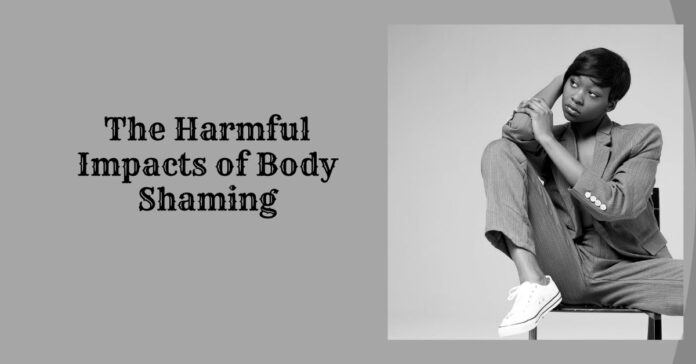Introduction
If you have ever had someone say something hurtful about your body, you know it can make you feel bad about yourself. Body shaming is simply when someone insults or makes fun of someone else’s physical appearance, and it can be done in any number of ways, from making fun of your weight to criticizing your skin to mocking the way you dress.
While anyone can become the target of body shaming, research shows that women receive the bulk of these comments and criticisms, making it an incredibly harmful trend that must be stopped immediately. Undoubtedly, body shaming has become all too common in society today, and its toxic impacts are far-reaching and long-lasting. Instead of playing a shame game and making people embrace, we should focus on what makes us unique from one another. Following are some of the harmful impacts of body shamming.
What is Beauty?
Because beauty is a subjective, cultural experience, there isn’t just one kind of right or wrong way to look. There are plenty of historical and contemporary examples where people who break these trends are considered more attractive than others who stay within them. It all depends on what society finds appealing at any given moment, and that can change throughout cultures and across generations.
Many women may feel pressured by unrealistic expectations from magazines and ads, but they shouldn’t blame themselves if they’re unhappy with their appearance. Thus, there is no standard definition of beauty; its definition varies from person to person and culture to culture.
Body Shaming Fuels Internalized Misogyny
Body shaming is not new, but the practice of criticizing women for their appearance is not new. Women have been scrutinized and condemned for centuries, if not millennia, for everything from choosing) an outfit for growing old. Recent studies prove that women who believe these statements about their bodies are more likely to accept fatter phobic beliefs about themselves. It means they are also more likely to value thinner bodies over their own.
Despite what many might assume, body shamers are not all men. One study found that 79 percent of participants reported experiencing objectifying or fat-shaming comments from another woman. Unfortunately, telling someone she’s too fat isn’t helping anyone. In fact, it could be making things worse.
Shame is Toxic
Shame is a particularly toxic emotion that undermines our sense of self. When caught in a cycle of negative self-talk, we develop low self-esteem and may seek validation from others. Seeking outside approval can often lead us to engage in unsafe sexual behaviors or may lead us to only associate with particular social groups because they are less likely to make us feel bad about ourselves. We often become more and more vulnerable to bullying and victimization because we lose touch with our own sense of worthiness over time.
Self-Objectification
Sexist comments and sexual harassment are so pervasive they have become normalized. For many women, it starts young, when we begin associating our value with our appearance. Take, for example, a study in which researchers instructed two groups of men and women to rate their own bodies on a scale from 1 (not at all attractive) to 7 (very attractive).
Then participants were asked how much money an unnamed male or female peer would have to pay out in exchange for watching them either touch their own body or someone else’s. Men were willing to make significantly higher bids when asked about a female peer touching herself than when asked about her touching another woman’s breasts. Also, a similar pattern was found among women who evaluated other women but not themselves.
Body Shame Prompts Harmful Response
Shame often prompts reactions that are opposite from our intended response. We might eat more when trying to diet, for example, or do nothing when we should be hitting a critical deadline. Understanding how shame causes us to act is essential because it helps us avoid behavior that can actually backfire and generate adverse outcomes.
The key is realizing that, while our conscious response may be shame itself, there are always underlying emotions causing those feelings that ultimately determine how we respond and whether we’ll succeed in changing our behavior. To avoid a setback, it’s better to figure out what you’re really feeling first before jumping into action based on your initial reaction. Only then can you choose between sticking with ineffective behavior and taking steps toward making real change.
Body Shaming Effects Relationships
A study published in The Journal of Social and Clinical Psychology in 2010 found that when girls are made fun of or shamed because they are not thin enough, it makes them more likely to gain weight to protect themselves. Shame is also an emotional amplifier, which means that when we feel bad about ourselves, we feel even worse than we would have otherwise. The researchers conclude that early negative peer experiences can increase children’s vulnerability to subsequent depression and disordered eating. Body-shaming by peers is linked with lower self-esteem, poor quality relationships with friends and significant others, binge eating, and other risk factors for eating disorders. It keeps us from reaching our full potential.
Suggested Readings










